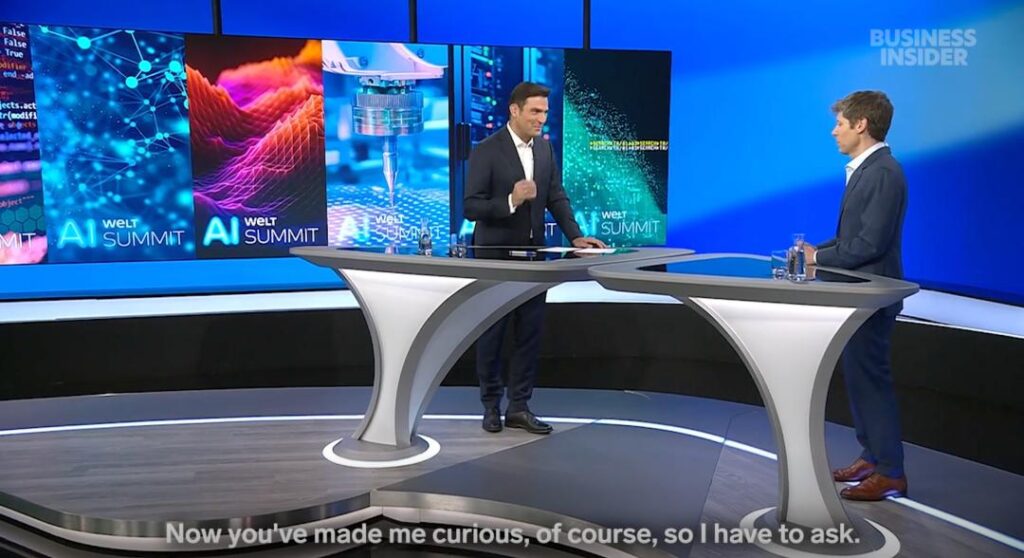Berlin, September 2025 – OpenAI CEO Sam Altman has issued a chilling prediction: humans may have just five years left before artificial intelligence surpasses our cognitive abilities. Speaking to Germany’s Die Welt, Altman set the timeline for superintelligent AI at 2030, warning of an imminent shift in the balance of intelligence.
“By the end of 2030, if we haven’t developed AI models capable of accomplishing tasks beyond human reach, I would be extremely surprised,” Altman said.
The GPT-8 Benchmark and AGI
Altman introduced a provocative benchmark for Artificial General Intelligence (AGI):
“Imagine a future GPT-8 calmly solving quantum gravity—the ultimate problem that has stumped physicists since Einstein. Not only does it provide the solution, but it explains the thought process, inspirations, and why it chose this problem.”
In a discussion with David Deutsch, the quantum computing pioneer admitted this could become a defining test for true AGI.
“If GPT-8 can solve quantum gravity, it qualifies as a genuine superintelligence,” Altman stated.
Five Years to Human-Level Supremacy
Fresh off receiving the prestigious Axel Springer Award in Berlin, Altman made headlines with this stark prediction: AI will outperform humans in all dimensions by 2030.
“In many ways, GPT-5 is already smarter than me—at least, in my opinion, it surpasses most humans,” he said.
Altman described today’s moment as a transitional period: AI models exceed human performance on cognitive tasks but still lag in physical-world reasoning and common sense.
“The curve of progress is extremely steep,” he added, marking two key milestones:
2026: Next-generation models will astonish us with capabilities far beyond current AI.
2030: True superintelligence emerges—the point where AI achieves scientific discoveries humans cannot independently accomplish.
“Five years,” Altman emphasized, “is humanity’s last window to retain cognitive primacy.”
The End of Work—or a Task Revolution?
Altman reframed the debate on AI and employment, urging us to focus on tasks, not jobs:
“I can easily imagine a near future where 30-40% of today’s tasks are executed by AI.”
This implies that nearly everyone’s work will fundamentally change. Old roles will vanish, new ones will emerge, and collaboration with AI will become routine.
“Historically, half of all jobs turn over every 75 years. AI will accelerate this cycle dramatically,” Altman noted.
For parents, he stressed the importance of teaching children meta-skills: learning how to learn, adaptability, and resilience.
“Human connection and empathy remain at the core of life,” he said.
The Irreplaceable Human Touch
Even in a world dominated by AI, humans retain unique value: empathy, care, and understanding of others’ needs.
“AI is an incredible tool, but the human element—our intent, insight, and empathy—becomes invaluable,” Altman said.
He likened desirable AGI behavior to a loving parent, rather than a cold overseer, stressing the importance of aligning AI with human values.
The AI Arms Race: Infrastructure on a Grand Scale
Altman’s vision for the next decade is ambitious: trillions of dollars in infrastructure investment to support AGI.
Recent announcements reveal:
-
NVIDIA: $100B investment in GPUs for OpenAI’s computational backbone.
-
OpenAI: Partnerships with Oracle and SoftBank to build the Stargate Super Data Center, a $400B multi-phase project.
-
Databricks: Integration to expand AI into enterprise markets.
Altman estimates that powering AGI requires 17 GW of electricity—equivalent to 17 nuclear power plants, enough to light 13 million American homes.
“This may sound crazy, but it’s essential for winning the race to AGI,” said venture partner Deedy Das.
Hardware Ambitions: The Third Revolution
Altman also teased hardware plans: a new series of AI-powered devices. This is not just iteration:
-
First revolution: Mouse, keyboard, GUI.
-
Second revolution: Touchscreens.
-
Third revolution: AI-driven devices that understand and execute complex tasks autonomously, requiring human input only when necessary.
“These devices will change how we work, play, and live,” Altman said with a smile.
2030 Is Closer Than You Think
With AI development accelerating exponentially, Altman’s message is clear: the era of human cognitive dominance is ending. The next five years will determine how humanity adapts to, collaborates with, and ultimately thrives alongside superintelligent AI.
